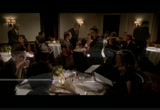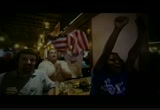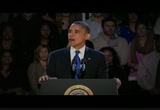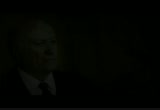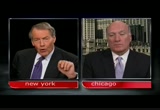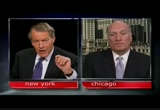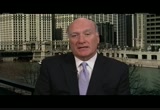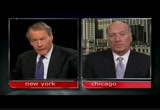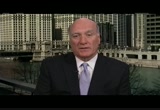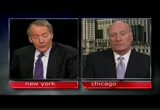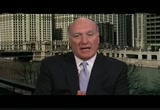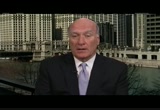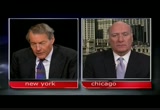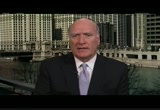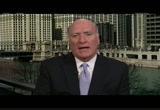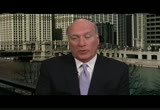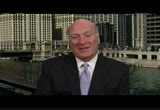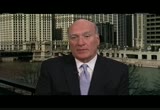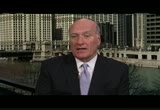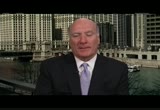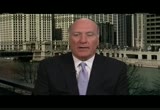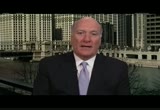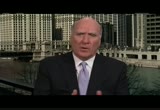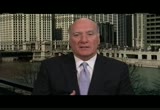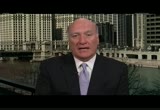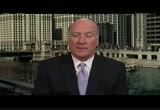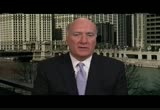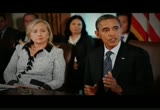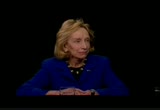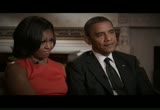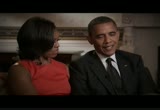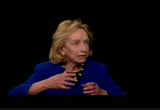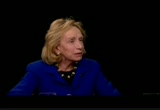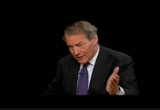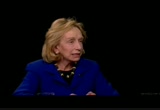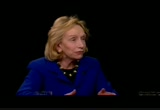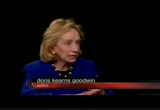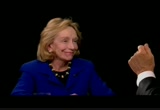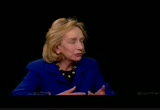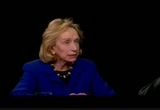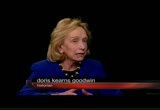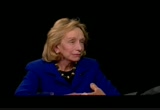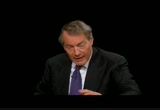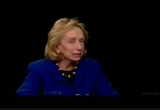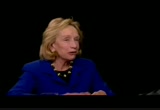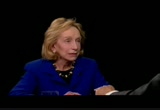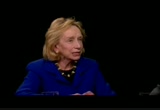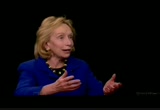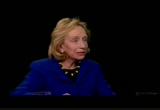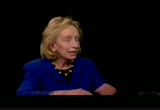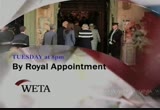tv Charlie Rose PBS November 7, 2012 11:00pm-12:00am EST
11:00 pm
questioned his credibility, questioned his validity got to stop this craziness and try to help him solve the problems for the american people. i think there's got to be a real -- he's got to reach out more, i'll gant you that. but they have to stop this craziness that they've been doing and reach back. >> rose: and to put all these political questions in context, we turn to doris kearns goodwin, the presidential biographer. >> and when you hear him give that speech last night he's thinking in terms of a story. he's connected to those people. he's telling the public there "your work is not done, i need you to push me from the outside in." that's what he needs to get hiss programs through. >> rose: bill daley and doris kearns goodwin when we continue.
11:02 pm
captioning sponsored by rose communications from our studios in new york city, this is charlie rose. >> rose: president obama has been reelected as president of the united states. the last few ballots are still being counted, but winning ohio gave the president enough electoral college votes for victory. governor romney, the former governor of massachusetts, conceded just after 1:00 a.m. >> and i ran for office because i'm concerned about america. this election is over but our principles endure. that i believe the principles upon which this nation was founded are the only sure guide to a resurgent economy and to renewed greatness. like so many of you, paul and i
11:03 pm
have left everything on the field. we have given all our to this campaign. (cheers and applause) i so wish -- i so wish that i had been able to fulfill your hopes to lead the country in a different direction. but the nation chose another leader so ann and i join with you to earnestly pray for him and for this great nation. >> rose: the race revealed america's shifting fault lines. it was a national conversation carried out in a few battleground states. billions of dollars poured into the campaign as both sides sought to define the other as responsible for the country's economic and partisan gridlock. but when it became clear that the long race had ended, both candidates spoke of the need for moving past division. here is what the president said. >> and in the coming weeks and months i am looking forward to reaching out and working with leaders of both parties to meet the challenges we can only solve
11:04 pm
together. reducing our deficit, reforming our tax code, fixing our immigration system, freeing ourselves from foreign oil. we got more work to do. (cheers and applause) but that doesn't mean your work is done. the role of citizen citizen in our democracy does not end with your vote america's never been about what can be done for us, it's about what can be done by us to the hard and frustrating but necessary work of self-government. that's the principle we were founded on. >> rose: many saw this election as a choice between starkly different visions of america, particularly the role of government and how to fix the economy. throughout the campaign, president obama emphasized the need for balancing individualism with collective values. in doing so, he echoed the
11:05 pm
language of the new deal as franklin delano roosevelt once said "in our personal ambitions we're individualalists but in seeking political progress as a nation we all go up or else all go down as one people." its remains to be seen whether the country can heal the wounds in the shadow of the fiscal cliff. we watch as president obama seeks to make good on his promises in a second term. joining me from chicago is bill daley. he served as white house chief of staff from january 2011 to january 2012. in february he was appointed as a co-chair of the president's reelection campaign. so my question first is about the politics of this election. how do you read the results? >> well, i think the results are as -- to be honest with you, if you look at the polls and the public speculation it ended up where everybody thought. the states that were going to be close were close and the president won all of them and we're still waiting to hear back on florida, obviously.
11:06 pm
but the message that was sent here was a couple of things. the president's message of this has been a tough four years, things are improving, give me a chance to keep trying to do and improve what we've been doing i think was listened to. i think the argument of the other side and that was just kind of an anti-message didn't resonate. demographic changes and an enormously sophisticated well-run campaign by the president was a game changer as far as this campaign was concerned. they took politics in campaigning as an organization to a very different level. >> rose: many people are saying it was the best job of campaigning they've ever seen. what was it they understood in your judgment? >> i think they understood who it is and what motivates their voters. and what you needed to do over a sustained period of time, not just in the last month or two. much of the structure of this campaign run by jim messina was
11:07 pm
set up beginning in' 11. so you had hundreds of people with dozens and dozens of offices opened quite a while ago and beginning to approach those obama voters and those that needed -- they needed to get in order to have a victory in these states. and they identify the eight or 12 states and it was the usual suspects and it was a masterful job done by the campaign. >> rose: some have suggested-- and you know campaigns, as i said-- that they understood the new role of data and how to analyze it. so you knew everything you could possibly know about who your voters were and what you needed to say to them in order to bring them out to the polls. >> exactly. i think the amount of data-- an obviously we're living in a very different world today where data is shareable and is known and is getable like never before-- and many people have no problem with that. and so they understood that. and they knew then what it took
11:08 pm
in a structure and organization to not only kind of harvest that data but use the data in order to affect election day. obviously governor romney began, i think, to put that together but he only had five or six months at most after his primaries without the sort of financial resources, either, to put that organization together where the president has had quite a lot longer to do that. >> rose: there are some who criticize this campaign because they say two things: number one, that the obama campaign was about tearing down mitt romney as an alternative, number one, and number two it did not offer any real clue as to whether where the president would lead. >> well, i would differ with that. not to your surprise, i'm sure. but number one i think, look, these are tough campaigns. they are negative. this president has endured four years of pretty tough negative stuff being thrown at him. some absolutely ridiculous, some
11:09 pm
ludicrous. and much of it not very productive to get results. so this negativity that is in our politics today was reflected in this campaign on both sides. obviously the president's campaign thought they had to define mitt romney has how they saw him and how they saw anymore a way that would affect the sort of voters that they needed to get out. on the other hand, the president's vision for the next four years i think is very much shaped, if you listen to the debates on the substance in those debates, around the things of trying to get better equality within our country, getting the economy first moving and being beneficial to more in the country. trying to address immigration reform. there's a whole host of thing he is has laid out, but what happens in these campaigns, if you take the last two or three months it is all about process,
11:10 pm
the horse race, the sort of ridiculous small things that people deal with in all due respect to the media seems to focus on too much. and the political system, culture, the culture of our country which has become a personality culture in many ways has very much infected the political system. and that changes the nature of these campaigns and you do away with the conventions than basically media events without real substance. >> rose: when will you were you as a democrat most worried? was it after the first debate? >> i think that was the period of -- there were some democrats that were running around-- not me, because i didn't have to-- lighting their hair on fire. just overreacting to -- obviously the president had a bad night. he said it. and governor romney had a night he had never had. but the craziness of some supporters or would be supporters of the president or people in the media who were
11:11 pm
supportive of him in reaction to that was way over the top. it was a bad night, that was all. and if you look back, that may have energized or got a lot of people excited but i don't think it moved many votes, to be frank with you, at all. i think the campaign stayed where it had been before, close in all those key states and they stayed close to the end. so i think if you look in hindsight all of the hysteria over that debate, probably with normal people in america they didn't pay as much attention to it as the people who are seemingly paid to follow this stuff and make some hype out of what are small events. >> rose: and, in fact, even though there were billions of dollars spent the election turned out to be pretty much where it was in september. >> rose: right. and the truth is there's been very it willed movement in this race for a very long time. the president knew even where i was there almost a year ago that this would go down to a very close election in certain states and it did and the president won
11:12 pm
them in a very close and difficult way. so even though he had won a number of those states, ohio and virginia and a number of those others, so close, popular vote. and the president understands that, we are a divided country and that will make for a more challenging period over the next four years. >> rose: some have suggested-- and these are takeaways that different reporters and journalists and political pundits have suggested. one, that 2008 was not a drill. that there was a reality in 2008 that continued through to 2012. it is an electorate that's -- an electorate that's gaining increasing consequence. >> oh, i don't think there there's any question that the electorate has changed. i thought the election in '08 had the potential to be a very defining moment. i think we have a -- and the president has governed as a center left. it's not a left. it's not socialist as some
11:13 pm
people try to define it. and i think that's sort of extreme definition of him actually came back in a negative way to hurt those people who are making those claims. the american people want government. they don't want big government. they want government that's more efficient and effective. but they want government to try to help solve their problems. and i think this president has tried to govern that way. no doubt it's not a right government, it's a center-left government, but that's a big difference between that and left and the american people saw that as more center than left and it wasn't socialist and it wasn't all those things that some people were making allegations and i really do believe became back to make their credibility less as they tried to attack the president. >> rose: here are three reasons some people are saying republicans did not do -- not republicans, but mitt romney did not do well. because the house is still republican, there are more republican governors, and the senate is democratic.
11:14 pm
but some are arguing that what happened here was that mitt romney was a bad candidate. number two, the republican party as defined has some issues that are dragging it and, third, there was hurricane sandy. what which of these theories do you think are accurate? >> well, wherever anyone loses there are people who say it's the candidates' fault, it's never the strategists fault, it's never the people's fault, it's always the candidates' fault. mitt romney had a difficult primary process. he came through it. therefore he was a better candidate than the other six or eight people that ran in that race. but he did struggle. i do think there are a number of points after the primaries where you didn't quite understand exactly what that came -- campaign was about. so they didn't really get their legs. not only -- not only did they seem to get their legs-- in hindsight it didn't have as much of an impact as much as the media made-- was that debate.
11:15 pm
i think there are things about that party, especially since 2010, that have really stressed them as far as their ability to be -- go beyond a very small base. as we've had demographic changes cultural changes they've not been able to adapt, so far, or the that changing picture i think hurricane sandy, obviously the president did what presidents do but he did in the a very strong way. fema had been reorganized. fema was very strong. the president spent a lot of time, a lot of effort and made sure fema was well funded and well organized and well directed over the last three and a half years that when a crisis like this happened they were prepared to move and i think they are moving well in spite of an ungodly situation for many people in new jersey and the president was there and that's what presidents do.
11:16 pm
had the president avoided doing that as though he was just campaigning it would have been a terrible thing. on the other hand, the president didn't try to soak that and use that as an excuse not to go out in the final days and take his argument for reelection to the american people and use that as some sort of excuse not to campaign. that would have been rick did louse and the american people would have seen that as a political move. >> rose: so now the president goes back to washington. he has the interim now between the lame duck status or you might argue before the inauguration and the old congress is still in power until inauguration takes place can he get anything done in this interim period? >> well, i think if the majority in the house want to get something done they can get something done we have a fiscal cliff being reached on january 1 with tax cuts expiring, a sequester going into effect. i don't think people can just
11:17 pm
ignore that. i know the president will not want to. we need to get our long term fiscal house in order so that the short term economic growth and activities and business can get back with some certainty to try and create jobs, increase their opportunities around the world. so i think if the president and congress want to they can get something done in the short term or at least get a framework they all agree on that then can get implemented possibly after the holidays. there's too much on the plate to wait until the new congress after january or the president gets regrated. >> rose: do you think the republicans are open to that idea? john boehner and mitch mcconnell. >> i've got to believe after this election they have to be open to that they have responsibilities beyond being political leaders and mitch mcconnell defined much of the last four years by saying his number one goal was to defeat barack obama. okay, that didn't work and now
11:18 pm
barack obama isn't going to run again so maybe he'll come up with another priority like let's get some things done. and i think if he does take that position -- but it will take enormous compromises also by democrats to get things done because this is a big hole we've dug ourselves in. >> rose: do you think -- will the president be different these four years because of, a, things he learned in the first four and b, he does not have to run for reelection again? >> i think not having to run for reelection does give a certain freedom. no question about it. on the other hand, we all do live within the confines of reality and he is in a very political town with a majority of the house republicans-- which was what he had the first four years. i think the president and that president i know really is somebody who wants to make a deal and reach across the aisle. it has been very difficult in the last two years after the
11:19 pm
election in 2010 where a very strident group drove the republican party to a majority in the house. so my sense is i think you will see a strong attempt by him to get a deal. he's not going to get rolled. he's not going to be somebody who's going to big somebody to do what they ought to do and that is the right thing. but you'll see an aggressive president try to get a deal on long-term fiscal soundness then other things like immigration, like climate change, all the things he mentioned last night. these are big problems and we can't start -- somebody even last night started talking about 2016. this is crazy. or 2014. >> rose: it's not crazy if you want to be president. i mean, people were thinking about it -- >> no, but how about doing something? most of the people thinking about running for president are going to run for president have real jobs that get paid by the taxpayers to do that job. go do that job and then maybe
11:20 pm
somebody will vote for you. >> you were with him at his side at the time of the killing of osama bin laden. you were with him at his side at the time when the rubber met the ground in the search for a grand bargain. give us an insight into who he is. >> i think what you see is what you get. a very smart, serious, good sense of humor. but somebody who takes that job extremely seriously, is able to sort of balance the job, balance all of the things that come in at him and unless you've been really close up and watched the president deal with the enormity of the issues that come -- nothing good ever comes basically to the president or to the oval office. >> rose: yes, that's right. (laughs) >> a lot of troubles. but i watched him go through challenges and decisions in a
11:21 pm
very methodical, serious and takes enormous -- and searches out for enormous amount of advice to make those decisions. not in a way thab that's highlighted often but as somebody who really gets all the different side to the problem, as he did in the osama bin laden raid. and challenged the assumptions of many people, whether they were military, intelligence and those challenge he is gave to them helped make a better plan, i believe, that was operated by enormously talented people in the military. and the intelligence agency. but he challenged a lot of their assumptions and that's real leadership. >> rose: on this program with you is doris kearns goodwin, who i'm sure you know, whose book "team of rivals" has often been cited because of the appearance of hillary clinton in the cabinet. one question that comes from her as well as others this morning in conversations i've had is this president really does need
11:22 pm
to reach out more in every way. perhaps in ways that are not comfortable for him in terms of engagement with the opposition. do you buy that? >> well, i think there's no doubt there has to be a coming together and that town -- i was gone for ten years from when i served president clinton as secretary of commerce to when i came back to be chief of staff. it's a very different town. it's a very different tone, attitude, the nastiness, the meanness, the personality personal piece of that town is really different and that was striking to me. but it needs two to tango, you know? the other side's got to get off their high horse of some of their madness in their allegations about him and their attitude about him and realize and accept the fact that the majority of the american people twice voted for this man to be their leader so all of these people who questioned his credibility, questioned his
11:23 pm
validity, they've got to stop that craziness and try to help him solve the problems for the american people. i think there's got to be a real -- he's got to reach out more, i'll grant you that. but they have to stop this craziness that they've been doing and reach back to try to really get -- >> rose: how would you like to see him reach out? >> oh, i think there's lots of ways the president can reach out to -- more activities at camp david that sort of thing. all those things people seem to think make a big difference. >> rose: do they? i think that's exactly argument. i'm not sure he believes that. does he believe it or not? >> i think you can have great -- i saw more republicans at the white house at more different parties, events, all waiting for families to get their picture with the president and then they go up and include people like michele bachmann and say the most outrageous things about the guy. you ask yourself if they believed it, why would they even want to be in the room with
11:24 pm
them? so that sort of thing has to stop. obviously that there has to be more civility in washington. but i saw him reach out a lot. did he stroke them as much as some politicians like to be stroked? i guess not. >> rose: because it's not in his nature? >> everybody's different. he's probably less of a showman, less of a back slapping politician. but you know what? these problems are so big that i don't care what you're like these people better get together. i think the president will try to do thaw ben they have to be open not only to come down and have a drink or go to camp david which is a nice place to visit, but get something done. that's more important. that's the president's attitude. doing the fluff stuff but then we can go have dinner or have a drink and enjoy our families or do something that we want to do as opposed to going through the
11:25 pm
motions for somebody else's purposes. >> rose: but the presidency does have the bully pulpit. >> he does have the bully pulpit and i think he showed in this election he's pretty good at using it. >> rose: (laughs) there is also this. this president and what he wants to do and the people who are around him has he had enough business people around him? because when you were selected as chief of staff, that was the thing that everybody took note of. bill daley will bring that business perspective, the president will be better for it. >> well, you know, i think -- getting people to serve in government is very difficult, charlie. and, again, another big difference than the last ten years and that would apply, i'm sure republicans would say the same thing. it's very hard. so getting those sort of people to come in to give up a lot, be b subject to what they're subject to is very difficult. my sense is that there will be changes both in the administration in the white house, it's just natural. but i think it's more about the
11:26 pm
policies and let me just say this about the business community. i know there's a lot of energy over the last couple of years and anger about the president, his plans and all that. now is the time for them to say, okay, he is our president. >> rose: right. >> there is no question on his validity. there's no question about -- and he wants to work with people. that is his nature. it truly is in spite of what may be said in the campaign. the business community has to come together and say okay, we may disagree but there are a whole host of things. like immigration. i know the business community, chamber of commerce, whole bunch of others who are historically republican are very much desirous to help the economy but getting real immigration reform. let's push it, work with the president, come into the president, come into the administration and say look, okay, you won. we didn't like it, we don't like it but let's work together. i think the business community has got to have that attitude and not just hope and pray as they did the last year and a half, many of them, that he
11:27 pm
wouldn't get reelected. well, that didn't work so well. >> rose: (laughs) no, it didn't. but there is also clear that -- some c.e.o.s came out during the campaign and said revenues have to be on the table when you talk about dealing with the debt issues and dealing with the fiscal cliff. >> absolutely. but they have to go say that to the people who don't believe that. who they support, often. and say look, the president very much a year and a half ago when we went through that debt debacle was talking about a balanced approach. he understands you can't do this all on revenue. there's nobody advocating to do that. it has to be a balanced approach. we need revenue, we need cuts in spending and entitlements. we know that. it has to be a balanced way, though. it cannot be done on one side or the other. and the people who -- many business people, many who i know absolutely -- and i firmly believe successful people in this country who have done very well understand that paying a
11:28 pm
little more is not going to change their life-style and if it helps the country, if they believe that it will go to something like deficit reduction and not be wasted they're all in favor of that. i don't meet many and i don't know many people who have been very success who feel don't understand that more revenue is needed. we had 39% rates on the high-income earners under bill clinton and we created 21 million jobs and the economy boomed. i'm not saying it was because of the tax that was a lot higher than now, but since these taxes were cut in '01, the economy hasn't exactly done that well and we've layered on debt for two wars we didn't pay for and other things we didn't pay for and now the chickens are coming home to roost and we have to pay that and our kids and grand kids have to pay that. but the beauty of a long-term fiscal problem is you can solve it over a long-term period.
11:29 pm
it is not something that has to be very done in a draconian way in year one. but you've got to make a deal that is over a long period so that the american people and especially at times of difficulty right now don't feel the brunt of it to the degree that they would if you solve this short term. >> rose: it's a balance between austerity and growth? >> exactly. not one or the other. people say you can't do what they did in europe. everyone knows you need growth. but you have to also have some austerity but it's a balance so that you aren't putting it all on the backs of the people who are suffering most right now and on the other hand you can't expect to get it all just taxing the wealthy because that won't work. even though they may have a lot of money they may have enough to carry everybody else because it doesn't work that way. and in order to stimulate the economy we have to get growth, we have to have entrepreneurs, you have to do the sort of things that encourage them, not
11:30 pm
deflate their enthusiasm for opportunity. >> rose: you mentioned bill clinton. how significant was his role in the campaign. >> oh, i think he played an enormous role. i mean, no one can take a complex issue and explain it to the american people as well as he can. that speech of the convention, it was true bill clinton and no one's been able to connect with people. and he had a successful eight years in a whole host of ways and i think he talked to democrats, independents, he obviously has the credibility of having served as president so he know it is job, he know it is challenges, he knows -- and look his period there with newt gingrich as speaker wasn't exactly singing kumbaya and holding hands. i mean, they did impeach him. >> rose: (laughs) >> but yet they got a lot of things done in that period and that sort of working together has to come back. >> rose: when you look at clinton can you imagine the role
11:31 pm
he might have? clearly he is interested in what hillary, the secretary of state, hillary clinton, decides she wants to do and he clearly says it's her decision and he will support it. but nobody that knows him that i know of doesn't believe he hopes she will run. >> well, i would assume knowing president clinton and the enormous respect and belief in hillary that she is a leader and someone's been very successful in her own right in so many ways and they've shown so much that he would like to see the country have her as a leader at some point. i'm sure he believes that. but that doesn't mean she's going to run. (laughs) >> rose: what do you think? she'll run or not? >> i made a comment earlier about 2016, i think it's madness for any of us to speculate about it. she probably is hoping she's healthy and she's enjoying life over the next four years and
11:32 pm
she'll worry about it then. >> rose: according to chelsea, the main thing she wants the s a grandchild. >> well, i can understand that since i have three granddaughters. i can understand the joy of that. >> rose: bill daley, thank you so much for joining us. it's a pleasure to have you here. we look forward to more conversations as we face these enormous problems now that we've got the election behind us. back in a moment. stay with us. we continue tonight with a look at the 2012 election through the lens of history. joining me now, doris kearns goodwin. she is a distinguished presidential historian. she has written biographies about lyndon johnson, franklin roosevelt and abraham lincoln. i am pleased to have her here on this program. welcome. >> thank you! >> rose: good to see you. >> it's good to be here. >> rose: so we reelected a president last night. you have written about presidents. what should we think about? what's the context for looking at the second term? >> i think the most important thing is there will be some sort
11:33 pm
of a mandate, not the country at large in general but for obamacare to continue and the dodd-frank probably not to be undone. but other than that, what we have to look for is him to build a mandate with a relationship with the people. and the most important thing is to learn from what he acknowledges he didn't do as well in his first term. that's when a president can make a second term work. >> rose: i want to show you this clip from a conversation the president had with me some six or eight months ago. here it is. we have a friend named doris kearns goodwin. i asked her what would lincoln do. in many conversations we have had, she has said before ma that what lincoln says and what she has learned is that the ability of lincoln and f.d.r. to learn from their mistakes of the first term is what made them successful in the second term. what do you think the lessons have been that might guarantee
11:34 pm
success in a second ferpl if that happens? >> i think that's your -- i think that's your question. pretty clearly. (laughs) >> you know, i -- when i think about what we've done well and what we haven't done well, the mistake of my first couple of years was thinking that this job was just about getting the policy right. and that's important but the nature of this office is also to tell a story to the american people that gives them a sense of unity and purpose and optimism, especially during tough times. >> it's not just a matter of finding the right words, although sometimes i think he needs to figure out how to talk
11:35 pm
in shorthand. like theodore roosevelt was so good with the square deal, speak softly and carry a big stick. he could compress everything in shorthand. but more importantly, the reason our great presidents communicate well like f.d.r. was because he could feel what the people were feeling. he could absorb their desires, hatreds and hopes. that's what theodore roosevelt did. he took train rides to his presidency. obama has to get out of the white house bubble and he's so good in the campaign because that chemistry is there and he's feeling what they're feeling. he needs to leave the white house more in these next four years and get back with the people. that's where his strengths come from. >> rose: just a moment looking back at the past, that's the very thing he was accused of not having before the campaign, that this sense of connection with the people. it's surprising for someone who came in 2008 with such fanfare to have have lost that. >> i think the white house becomes that kind of bubble today more than it ever did
11:36 pm
before. if you are a person who gets their strength from that connection you have to figure out how everyday you build into your schedule -- i don't think the letters work enough. he has letters from ordinary people. you have to go see the people. you have to feel the people. and somehow like lincoln had these public opinion baths every morning where people would roam in and his assistant said to him "you don't have time for these ordinary people." he said "these are my public opinion baths, i must never forget the popular assemblage from which i have come. he should have press conferences twice a week like f.d.r. just engage. he has the personality and temperament to do it but the part of him that's an observer loses that instinct. >> you said he has the personality and temperament because that's one of the things you raised. he's a professor, he doesn't think in terms of dialogue and conferrings, he thinks in terms of lectures. >> rose: you hear him give that speech last night he's thinking in terms of a story, he's
11:37 pm
connected to those people. he's telling the public there your work is not done, i need you to push me from the outside in. that's what he needs to get his programs through. i think he got it. >> rose: you they? >> i think he has it. >> within him? in his d.n.a. >> it got lost somewhere in the white house bubble. >> rose: and that happens and you have to recapture who you are and therefore you fail in terms of your mission. he also had enormous expectation coming in. i think he probably assumed he could do more because he had the belief in what he was saying. but had he not been in that place in understanding all that goes with that job you realize it takes more than just words. >> and i think even nobody could have imagined how broke than political culture was. >> rose: and still is. >> and still is. the political culture is broken for a long time when you look back on it. it's like 50 years as bad as i've seen it. not as bad as when they were having revolvers on the floor during the 150s.
11:38 pm
but do you realize these guys don't form friendship over party lines. they don't drink together on the weekend, they run home to raise money for their funds and they weren't in world war what together like a whole generation of congress and senators were. so i don't think there's any way he could have known how difficult it was going to be. and he came in, i'm going to be post-partisan. you can't be now. >> rose: what could he -- and you knew lyndon johnson very well. what could he learn from lyndon johnson? >> i think and i think he still can learn from him, i think he has to make the white house a political asset more than he has. i think what happened is he had his family there. that's an a source of an enormous strength of him. he has his wife and amazing children but you have to use the white house as the people's house. those congressman and senators should be coming over there more. they should go to football games and movies. l.b.j. had them there for breakfast, lunch and dinner until 2:00 a.m. >> rose: we know this, l.b.j. went to baseball games because he wanted to sit next to richard
11:39 pm
russell even though he didn't care about baseball. the opportunity to have that much time with richard russell and it led to a friendship and therefore when he was in his darkest days russell was a person who reached out on the phone to say, you know -- what's happening? >> you're right. he would go and read the sunday papers with richard russell but that means he's not home with his family. so you're making a huge sacrifice. i think there's so many congressman and senators even symbolically that want to come with the white house and it's amazing how few have. have them over. let them come through, take them through tours. >> rose: i just heard a story about lyndon johnson over the weekend, it may have been on one of the sunday shows in which ef red dirkson slams the phone down his ally on civil rights legislation and says "no, mr. president, no." and suddenly like ten minutes later somebody hears a whole commotion, lyndon johnson has come up there with his beagles -- >> (laughs) >> rose: and a fifth of bourbon,
11:40 pm
probably, whatever they drak and said "everett, we're going decide how we'll fix this." and there was a relationship so they could build on it and together do it so that the other person feels that they are participants. >> you have to give them ownership and i think obama did that by allowing the congress to take a while to create the health care bill. whatever he wants to get done he has to be in there personally with these guys. even if you can't change their minds right now, i think that's part one of what he has to do is let the country know he's reaching out. if they still are obstructionist and won't come forward then you have to mobilize the country to pressure them from the outside in and you play an outside-in game. >> rose: we were talking about it this morning. perhaps doing a call to john boehner saying what are you doing for dinner? come over for dinner." >> sleep over! i've got the lincoln room. >>. >> rose: and talk about how from this day forward we can make sure it doesn't slip into what
11:41 pm
it was last year. >> you have to hope these congressmen and senators, they're down there wanting to accomplish something, you have to hope somewhere inside of them. what l.b.j. says to dirkson, you come with me on the civil rights bill 200 years from now, school children will know only two names, abraham lincoln and everett dirkson. but in the meantime he's giving him dams, public work projects, anything and the whole state of illinois will be sunk. >> rose: so it was both. >> it was both. >> rose: he would use a carrot and a stick as well. >> always. >> rose: if he needed to threaten, that was the threat he would make. >> and now the president has strength. he is won this election. and he can mobilized that public. he said to those people that were there, those supporters last night, your job is not done i need you. what that means is that he needs them to keep -- teddy roosevelt understood he was never going to get conservative republicans to do what he wanted them to do. he needed to mobilize the country through the muck raking press, through himself and then pressure those people from the outside in. >> rose: you watched him and met
11:42 pm
with him, you were one of the historians he would meet with. how many times? three or four? >> three times. >> rose: what did you get out of sniz >> i think what he wanted is we come in bearing our presidents, truman walks in the room and jefferson comes in. >> rose: he comes in on your should we are lincoln and johnson and teddy roosevelt and jack kennedy? >> and they all have stories they can tell him, right? so we can talk about homely phrases he uses, not this soaring language. you can learn from jefferson certain kinds of things. you can learn from truman, are you going to go against the congress? do nothing congress. and he loves stories from history and i'll tell you, that's him at his best. we sit around there, if someone hasn't spoken he'll call on that person to speak. if you say something that sounds intelligent he'll pick it up and say that was interesting. >> rose: so he's engaged by the conversation? >> i think he loved those evening. we certainly did. >> rose: he wanted to do more than three? >> well, it takes time! >> rose: oh, he has over things to do as well, doesn't he?
11:43 pm
he? >> (laughs) i guess so. >>. >> rose: so looking forward, to use the bully pulpit, one thing is play the congress, which you have to do. >> that's the granular level of getting bills through. you also have to make sure, as ronald reagan did, who yo you have not written about, (laughs) >> (laughs) >> rose: that you can in a sense appeal over their head so that the people at home hear you. >> that's right. >> rose: one of the problems is i'm not sure the bully pulpit as an institution is as powerful as it once was. somebody gives a speech, in the old days, lincoln's speech would be printed in full in the newspapers. people would absorb it. f.d.r.'s radio chats were listened to by 80% of the people. you give a speech and the pundits are taking it apart before you've almost been finished. somebody like joe wilson says "you lie," that becomes the story that week. even so i would recommend somehow he not use tell prompters. f.d.r. knew when he was giving his radio chats that he needed people in the room so he could pretend he was talking to
11:44 pm
people. >> rose: here's the thing lyndon johnson never learned well. he never did. his tell prompter was called mother because he wouldn't go anywhere without mother. >> rose: and he made jokes about it himself but it is, in fact, learn to talk in a way that you are not reading. >> right. >> rose: so f.d.r., what does he learn from f.d.r. >> the most interesting thing he might learn from f.d.r. is if he does need to pivot somehow to make a better relationship with the business community so he can figure out a way to mobilize the country to be more competitive with global economy, to make sure we've got jobs that are really good jobs going forward. f.d.r. pivoted from dr. new deal to dr. win the war. he stopped his hostility toward the business community but he never let labor go. at the same time. and he gave antitrust regulations, he eased up on those. he gave profits to business, he accelerated depreciation, he did everything to get those ships,
11:45 pm
tanks and weapons built. we need to do something like that again. he had business leaders in his inner circle. f.d.r. did. f.d.r. did. he brought in sears and roebuck, wall street. joe kennedy is running the s.e.c.. so i think he could do that. maybe he'll bring mitt romney in to run his business department. >> rose: (laughs) or be ambassador to china. if >> oh, my god! now there's a thought. >> rose: or secretary of commerce. the country needs to feel purpose because it's got the heavy burden of a fiscal crisis but it can't lose sight of what it is that made us who we are. >> you're so right. i mean, just to go back to j.f.k.'s inaugural address. i mean, there was that sense of we are going into a new generation, we're moving forward together. where f.d.r. even in the worst days of the depression he could imagine what the country would be like when everything was moving again. then people feel it. that's the mystery of leadership. if the leader feels we ear able
11:46 pm
to go forward together, it's a contagious feeling and people been by the to feel it. that's the sense we need. america still has all these strengths. we still -- we're still doing better than most of the other countries in the world. we have to remember that. we feel like we're on a downward slide but we're not. >> rose: not on economic growth rate but all the things that brought us there. >> they're still there. >> rose: here's the president last night talking with great almost also separation the way he talked in the 2008 campaign and the way he talked at denver. here it is from last night. >> i believe we can seize this future together because we are not as divided as our politics suggest. we're not as cynical as the pundits believe. we are greater than the sum of our individual ambitions and we remain more than a collection of red states and blue states. we are and forever will be the united states of america. >> rose: so there it is. a sense of the aspiration of this --
11:47 pm
>> rose: that was a great speech last night. i really do think he had his rhythm. it was both soaring but conversational it was about the people who supported him and the public rather than just here i am, what i've done. it was that connection he established. it was a very conversational but exciting tone last night. >> rose: are we looking at somehow because of this election -- first of all, a different lech snort >> you do see the nation moving forward in a lot of different degrees. look at the gay marriage ballot. look at where latinos are coming for the desire for immigration reform women out there being stronger now, wanting their own pay equity, wanting things for them. if the republican party remains narrowly white men -- >> rose: right. (laughs) >> and older people. (laughs) >> then women, latinos, african american, youth are going to undo them. so they have soul searching to do just as the democrats did after the midterm election. that's what you hope loss does for people.
11:48 pm
that it makes you understand where you have to go. it's tough for romney right now. you know what it's like when those people lose. i remember hearing that at one point mcgovern had, of course, lost big and so had -- who is the other guy who lost big? >> dudack. >> no, not dukakis, one of them asks the other one who lost 12 years earlier -- it was mondale, mondale asks mcgovern, when do you stop feeling bad? mcgovern says "i'll tell you when. it hasn't happened yet." >> rose: because you understand how you did not make it to an office that you had enormous potential to do good. >> rose: exactly. and they also go through what if i had done this and hasn't done that. it's tough. >> rose: nobody can answer. those are all what if questions you can't -- you can >> drive yourself crazy. >> rose: and you have to accept the fact that intervening events can come. whatever the surprise might be. whether it's a storm or a misreading of something. it's sometimes not of your own making. >> i think the storm helped obama a lot because it showed
11:49 pm
him -- he was outside. >> >> it showed him presidential, connecting to the people and it made the opposite point of the 47%. there are these fire people really being strong helping people and they were the ones presumably undermined by mr. romney. >> there's also this. my country elected a democratic president and a republican house and a democratic senate. a larger number of republican governors. so it's not a country that's speaking with one voice about what it wants from its leaders. >> which means that the leader is going to have to absorb what that other voice is and compromise is going to have to happen. that's what this country was built on in the first place. compromise, compromise, compromise. >> and all of those presidents understood that. >> and you have to keep your convictions but compromise. >> rose: all right, here it is. >> there he is! >> rose: is he your favorite? >> lincoln? there's no question. i feel guilty saying that because i'm living with theodore roosevelt now and f.d.r., i feel like i'm betraying him but
11:50 pm
there's nobody like this guy. i miss him. that's why i'm so excited. >> rose: what does your husband think? >> he gets upset with these dead presidents i wake up with in the morning. >> rose: but this is the one. >> abraham lincoln. there's something about his person that makes you feel if you could be like him you'd be better. you'd forget grievances from the past, you'd forgive people that hurt you. you wouldn't let bad feelings fester inside of you. i guess the struggle he had, the failures he had, he kept persevering and succeeded and that desire to leave something in history and be worthy and have his story told after he died, he would be so happy to know. here we are still -- here he is. now he'll be on the big screen. >> rose: here's a scene from this movie which is called "lincoln," extraordinary movie directed by steven spielberg. the part of lincoln played by daniel day-lewis. >> the first common notion is this: things which are equal to
11:51 pm
the same thing are equal to each other. that's a rule that mathematical reasoning is true because it works. has done and always will do. in his book he says this is self-evident. you see, there it is. even in that 2000-year-old book of mechanical law it is a self-evident truth that things which are equal to the same thing are equal to each other. >> rose: clearly the title of your lincoln book was "team of rivals." the president didn't do enough of that. he had bob gates. >> right. and he brought hillary in. and he brought biden in. he tried to get judd gregg in but he finally turned away. see, i think again -- f.d.r. did it with two republicans on top of his cabinet. i think the conditions are just much harder now. >> rose: conditions are harder so it demands more of that.
11:52 pm
>> i think it does demand more. >> lincoln also in this film and in your book was a poll station to his -- to his bone marrow. >> i think one of the wonderful things about the movie is we're so cynical about politicians and we think of him as a statesman but underneath, in his bone marrow, he's a politician. he loved making deals. he runs around in this movie giving promises to people. i'll do this for you, i'll do this for you. it's the days before civil service, you can give jobs to people. >> rose: because he decided that the emancipation proclamation was the most important thing he could do? >> well, even more importantly, he knew the emancipation proclamation had been done but it wouldn't have legality after the war ended. so he needed that 13th amendment back and he needed to get -- >> which incorporated and they needed to two-thirds in the congress to do that and he was willing to do anything to get that done. >> rose: make any deal. >> he's l.b.j. back then! but for a good and worthy cause.
11:53 pm
it was war worth it. meanwhile he has to bear the burden that if the war ends before he makes his deal and the 13th amendment passes then slavery may not be undone forever but everyday the work continues. >> rose: he also felt it would hasten the war. >> but he can't led the war end before he gets this done. it's astonishing to watch daniel day-louis, he incorporated lincoln's walk. >> rose: it's kind of bearing the weight of -- >> he's a tall guy, they sort of bend over. but they said he was like a laborer. and he would come home from walking as if he was walking over tough ground. and daniel knew that, he walks like that. we know that he had a thin high-pitched voice and he talks that. >> rose: how do we know that? is that how people describe him? >> that's -- i have descriptions of people watching him walk and talking about how weirdly he walked and there's descriptions of anymore the debates with steven douglass and douglass had
11:54 pm
this big baritone voice and lincoln's was high pitched but because it was high pitched it could carry over the crowd of 10 people better than lower voice. so they could authenticated that. i went to the filming in richmond and they had created a white house set and they took me -- they opened a door and here was the white house in 1860 -- i was blown away. i've imagined it for ten years in my life and suddenly the wallpaper is as it was the books he was reading are first edition books. the carpet had been recreated. and to see this character -- here's my lincoln and he's back again. >> here's what interesting. he was a reader. self-educated. >> absolutely. >> rose: i'm just reading the new biography of jefferson by jon meacham. jefferson was a reader. >> absolutely. >> rose: even when he went back to monticello, read to the kids by the fire. >> reading was a part of the people's lives in the older days in the way it's not part of ours. they didn't have as many
11:55 pm
distractions. for lincoln he had only 12 months of formal schooling. all the rest he got on his own. it was said when he got a copy of the king james bible or shakespeare's plays he was so excited he couldn't eat, he couldn't sleep. that's what you want. >> rose: the book is called "team of rivals" as you know and the movie coming out is called "lincoln", a steven spielberg film starring daniel day-lewis, the author is dorr rinse kearns goodwin. thank you. >> you are so welcome as always. >> thank you for joining us. see you tomorrow night.
11:59 pm
162 Views
IN COLLECTIONS
WETA (PBS) Television Archive
Television Archive  Television Archive News Search Service
Television Archive News Search Service 
Uploaded by TV Archive on

 Live Music Archive
Live Music Archive Librivox Free Audio
Librivox Free Audio Metropolitan Museum
Metropolitan Museum Cleveland Museum of Art
Cleveland Museum of Art Internet Arcade
Internet Arcade Console Living Room
Console Living Room Books to Borrow
Books to Borrow Open Library
Open Library TV News
TV News Understanding 9/11
Understanding 9/11
